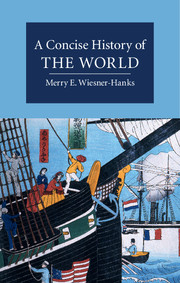Book contents
- Frontmatter
- Contents
- List of figures
- List of maps
- Introduction
- 1 Foraging and farming families (to 3000 BCE)
- 2 Cities and classical societies (3000 BCE–500 CE)
- 3 Expanding networks of interaction, 500 CE–1500 CE
- 4 A new world of connections, 1500 CE–1800 CE
- 5 Industrialization, imperialism, and inequality, 1800 CE–2015 CE
- Index
3 - Expanding networks of interaction, 500 CE–1500 CE
Published online by Cambridge University Press: 05 October 2015
- Frontmatter
- Contents
- List of figures
- List of maps
- Introduction
- 1 Foraging and farming families (to 3000 BCE)
- 2 Cities and classical societies (3000 BCE–500 CE)
- 3 Expanding networks of interaction, 500 CE–1500 CE
- 4 A new world of connections, 1500 CE–1800 CE
- 5 Industrialization, imperialism, and inequality, 1800 CE–2015 CE
- Index
Summary
Scholars and poets in the cities of Renaissance Italy viewed ancient Greece and Rome as the height of civilization, a golden age they sought to emulate and revive after a long period of darkness. Scholars and poets in other cities who lived during that period of darkness had a different opinion of their own era, however. One of these was Rashid al-Din (c.1247–1318), a highly learned vizier at the court of the rulers of the Ilkhanate, one of the four divisions of the vast Mongol Empire that had been established by Chinggis Khan (1167–1227). From a family of imperial officials, and a convert from Judaism to Islam, Rashid al-Din was trained as a physician, but was commissioned by two Ilkhan rulers to write a history of “all the people of the world” that would make plain the importance of the Mongols. Such a history was possible, the Ilkhan ruler Öljaitü commented, because “all corners of the earth are under our control and that of Chinggis Khan's illustrious family, and philosophers, astronomers, scholars, and historians of all religions and nations … are gathered in droves at our glorious court, each and every one of them possesses copies of the histories, stories, and beliefs of their own people.” Rashid al-Din relied on those written histories, which included western European and Indian Buddhist chronicles, Hebrew Scripture and other Jewish texts, Persian epics, and Chinese treatises, as well as the oral testimony of merchants and emissaries from many places living in the Ilkhanate capital of Tabriz, to produce an enormous hemispheric history, the Compendium of Chronicles(Jami’ al-tawarikh), which he finished around 1310. Lavishly illustrated copies were made in both Arabic and Persian in a university complex in the city, destined for other cities in the Ilkhanate. In Rashid al-Din's opinion and those of the rulers he worked for, the golden age was not in the past, but now, when the Mongol states encouraged the movement of people and goods and the exchange of ideas across Eurasia. The Ilkhan rulers themselves were active in this exchange, sending emissaries and letters to the pope and the kings of France and England in the hopes of arranging a military alliance against the Turkish Mamluk rulers of Jerusalem and the territory around it.
- Type
- Chapter
- Information
- A Concise History of the World , pp. 135 - 209Publisher: Cambridge University PressPrint publication year: 2015

